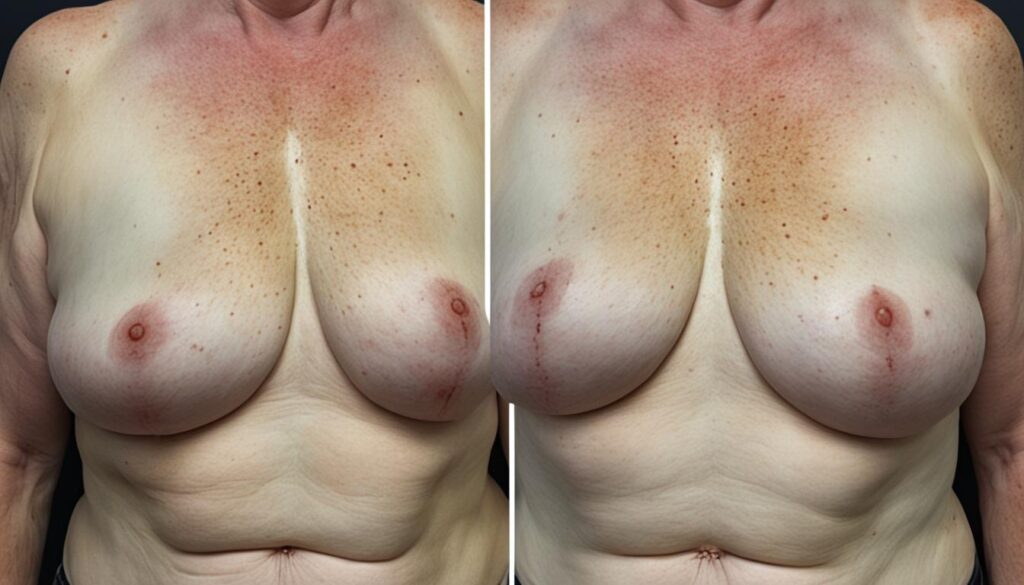I was thrilled to have my baby and start breastfeeding. But, my joy turned to worry when I found out my past surgery might make it hard to breastfeed. I felt lost, not knowing how to make this journey a success.
Breast enlargement surgeries, breast augmentation, and breast implants can make it tough to breastfeed successfully. The surgery used, where the cut is made, and how the implants are placed can influence milk production and nipple feeling. It can also raise the chances of problems like mastitis or infections.
I started digging into these breastfeeding challenges and lactation issues. It became clear I needed to be proactive and get the right support. Moms with breast surgeries, like me, need to watch out for their baby’s weight. We might need help to make more milk or use donor milk or formula.
This whole experience has been a journey. I want to use what I’ve learned to help other moms in my situation. Knowing the risks and planning ahead can lead to a better and smoother breastfeeding journey.
Key Takeaways
- Breast enlargement surgery can impact a mother’s ability to breastfeed successfully.
- Surgical techniques, incision locations, and implant placement can affect milk production, nipple sensation, and the risk of complications like mastitis and infections.
- Mothers who have undergone breast surgery need close monitoring and support to ensure adequate infant weight gain and milk production.
- Transgender parents who have had breast surgery may face unique challenges with inducing or suppressing lactation.
- Understanding the potential risks and complications is crucial for planning a smooth breastfeeding experience after breast enlargement surgery.
Understanding Breast Enlargement Surgery
Breast enlargement surgery includes various procedures. These are breast augmentation with implants, breast lift (mastopexy), and reduction. They aim to improve breast size, shape, and look. However, they might affect a mother’s capability to breastfeed.
Types of Breast Enlargement Procedures
There are different breast enlargement surgery methods. Each one affects breastfeeding in its way. It’s essential for moms planning to breastfeed after surgery to know these procedures.
Breast Augmentation with Implants
Breast augmentation involves adding silicone or saline-filled implants. This increases breast size and fullness. The choice and position of breast implants influence breastfeeding.
Breast Lift and Reduction Surgeries
Breast lift surgery corrects sagging by removing extra skin and shaping the breasts. Reduction procedures reduce breast size and weight by removing tissue and fat. Their effects on breastfeeding depend on the surgical methods and incision sites.
Potential Breastfeeding Complications After Surgery
Breast enlargement surgery might make it hard for a mother to breastfeed. The method, where the cut is made, and placing implants can cause issues. These include making less milk, hurting the nipples and nerves, and a higher chance of getting sick.
Impact on Milk Production
Surgery can harm the ducts and nerves needed for breastfeeding. This might lead to less milk being made. So, moms may find it tough to feed their babies well.
Nipple and Nerve Damage
The looks and feel of the nipple and areola can change after surgery. This, along with scar tissue, can make feeding hard. The cuts might also hurt the nerves of the nipples, causing more trouble.
Increased Risk of Mastitis and Infections
Surgery can raise the risk of mastitis, a bad breast infection. This can make feeding hard. Moms who had breast surgery should get checked a lot. Lactation consultants can really help them and their babies.

Can breast enlargement surgery cause complications during breastfeeding?
Breast enlargement surgery, like augmentations with implants, can cause breastfeeding issues. The placement of these implants matters. They can be put either above or below the chest muscle. How they’re placed affects milk production and breast function.
Breast Implant Placement and Breastfeeding
Implants above the muscle can affect milk ducts and nerves. This could lower milk supply and cause nipple issues. But, if the implants are under the muscle, they might not affect breastfeeding as much. The muscle can protect the milk ducts and nerves.
Surgical Techniques and Milk Duct Damage
The surgical methods used also play a role in breastfeeding complications. Procedures that involve areola and nipple detachment or incisions around the areola may disrupt milk ducts. This can lead to less milk production.
Incision Location and Nerve Impairment
Where incisions are made can also matter. Incisions under the breast or in the armpit might damage important nerves. These nerves help with nipple sensation and the let-down reflex. Both are key for effective breastfeeding.
If you’re thinking about breast enlargement, knowing these details is key. It’s important for a good breastfeeding experience later on. Support from lactation experts can also help reduce issues and improve your baby’s feeding time.
Breastfeeding After Mastectomy and Breast Cancer Treatment
After dealing with mastectomy or radiation therapy for breast cancer, breastfeeding might be hard. This is especially true for mothers who had partial or total mastectomy. They might not make as much milk from the affected breast due to nerve damage.
Unilateral breastfeeding should be considered if one breast is totally removed. This means milk can only come from one breast. Problems may also arise from the effects of radiation therapy on milk supply. Mothers in such situations need extra help from experts to ensure their baby gets enough to eat.
Unilateral Breastfeeding
After a mastectomy on one side, mothers may opt for unilateral breastfeeding. They can feed their baby from their remaining breast. But, this effort might require more support and specific plans to meet the baby’s nutritional needs.
Radiation Therapy and Milk Production
Radiation therapy may lessen a mother’s milk supply. It can harm breast tissue and the nerves for producing milk. Working closely with lactation experts is key. They can offer ways to boost milk production or suggest alternatives like donor milk or formula.

Monitoring and Supporting Breastfeeding After Surgery
Mothers who get breast enlargement surgery need extra care to breastfeed successfully. Lactation consultants help a lot. They check how the surgery affects milk making. They also give advice on ways to make more milk. Plus, they teach mothers the best way to hold and feed their newborns.
Lactation Consultations
Lactation consultants know a ton and can be a big help. They work with moms to make a plan that fits their needs. This plan can help make more milk and work around any problems. The goal is to make sure babies get all the food they need.
Supplementing with Donor Milk or Formula
Sometimes, the breast doesn’t make enough milk. In these cases, using supplementing with pasteurized donor human milk or formula is important. Lactation consultants can guide moms on this. They can help keep breastfeeding going strong while making sure babies eat well.
Emotional and Psychological Support
Mothers who breastfeed after surgery may find it tough. They might feel sad, disappointed, or frustrated. They need emotional and psychological support. Talking to support groups, counselors, or mental health experts can make a big difference. This support is vital during this period.

Transgender Parents and Breastfeeding After Breast Surgery
Some transgender parents have had breast or top surgery. They might want to breastfeed or chestfeed their babies. It’s important for healthcare providers to know about the challenges these parents face. This knowledge helps them give the best care to the whole family. It also helps meet the baby’s nutritional needs well.
Inducing Lactation
Transgender parents needing help to start lactating can get guidance. They might use drugs or breast pumps to produce milk. With the right support, these parents can provide their infants with the advantages of breastmilk.
Lactation Suppression
On the other hand, some may decide not to breast or chestfeed. These parents can take medicines or use other ways to stop lactating. This choice lets parents do what they think is best for their family and their personal wishes.
Finding Appropriate Support Resources
It’s key for transgender parents to find the right support for breastfeeding after surgery. They may need help with lactation or emotional support. Healthcare professionals should link these families with special help and communities. This is to make sure their breastfeeding journey is fulfilling.

Risks and Complications of Breast Implants
Breast enlargement surgery is life-changing for some. However, it comes with risks. These include implant rupture, capsular contracture, and a rare form of cancer.
Implant Rupture and Deflation
Both silicone and saline implants can rupture. When this happens, the breast’s shape may change. This issue can be fixed with more surgery.
Capsular Contracture and Scarring
Scar tissue can tighten, making the breast hard. This condition can be painful. Surgery might be needed to fix it.
Breast Implant-Associated Anaplastic Large Cell Lymphoma (BIA-ALCL)
A rare type of cancer, BIA-ALCL is linked to some breast implants. It can cause fluid buildup or a mass in the breast. Immediate attention is vital.
Regular checks and quick treatments are key to breast health. These help in having successful breastfeeding and maintaining overall health. It’s wise for patients to talk openly with their doctors about these risks.

FDA Regulations and Safety Considerations
The FDA works hard to ensure everyone knows the risks of breast implants. They’ve put rules in place to limit the sale of these items. The goal is to make sure patients get all the facts about the safety and rules for these medical products.
They keep updating their advice on what to watch out for with breast implants. This includes things like safety concerns, leaks, and a rare cancer. It helps patients be aware of what could go wrong.
If someone’s thinking about getting breast implants, it’s crucial they look into the FDA’s latest safety info. This awareness helps people choose what’s best for their health. And it lets them take an active role in their care.

Conclusion
Breast surgeries like augmentation, lift, and reduction can change a mother’s breastfeeding journey. The surgery’s approach and where the incision is made influence milk production, nipple sensation, and risks of mastitis and infections. Mothers should get extra care to ensure their baby gains weight. They need help to boost milk production or use donor milk or formula if necessary.
Transgender parents with breast surgeries may find it hard to control lactation. Knowing the potential risks and complications is key to a good breastfeeding experience after surgery. Always consider FDA regulations and safety necessary for patients mulling over breast implants.
It’s vital to talk openly with doctors before getting breast enlargement surgery. Make sure to discuss how it might impact breastfeeding. Also, learn about the help and resources available to make feeding your newborn successful.
